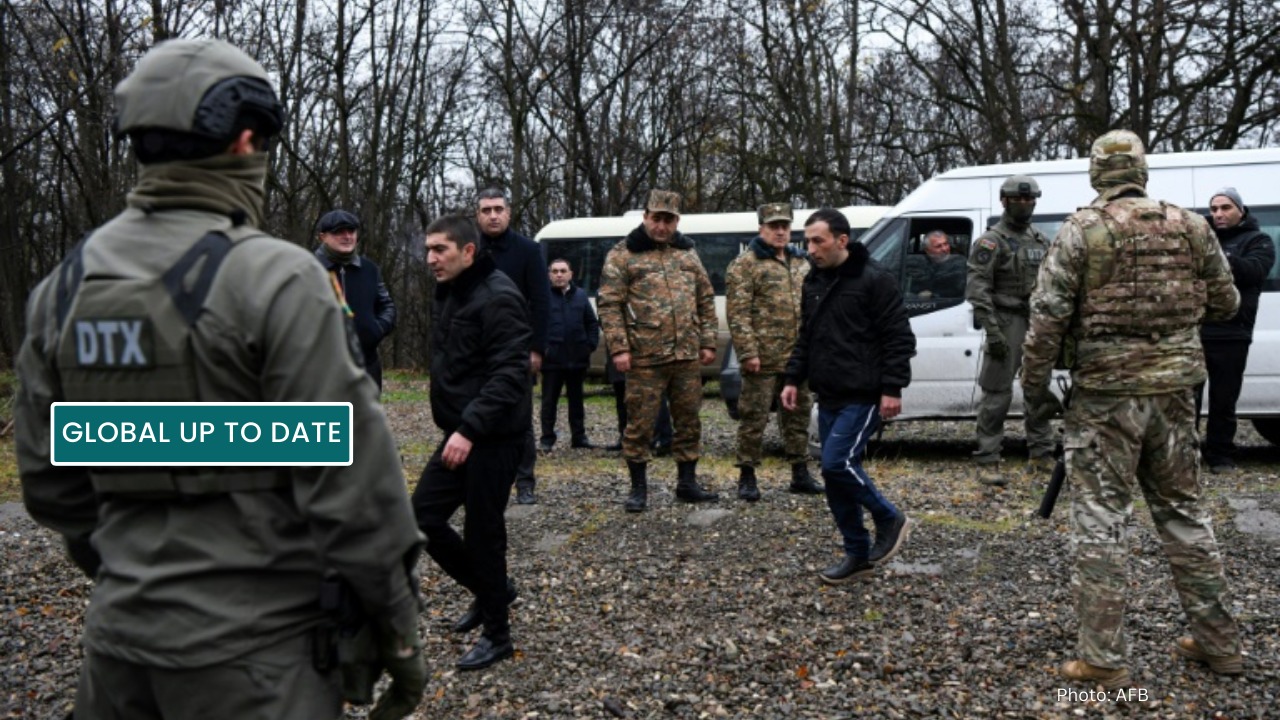Prisoner Exchange Marks Milestone in Armenia and Azerbaijan's Path to Reconciliation
Aong Cha Ching Marma | 14 December 2023
Armenia and Azerbaijan took a significant step towards revitalizing their conflicted relations by exchanging prisoners of war (POWs) on December 13, 2023. The effort towards the normalization of relations took place for the very first time after the September 2023 conflict over the Nagorno-Karabakh region. The prisoner exchange between the two countries is seen as a potential “breakthrough” in the long-standing conflict. The exchange deal came to pass without any international mediators, as per the Al Jazeera news report. However, French President Emmanuel Macron and German Chancellor Olaf Scholz were invited to join the President of the European Council, Charles Michel, as mediators in talks between Armenia and Azerbaijan.
The long-standing conflict between the two neighboring countries started over a century ago in 1918, after the collapse of the Russian Empire. The conflict occurred over the Nagorno-Karabakh region for the very first time in the history of the South Caucasus, and significantly in the history of Armenia and Azerbaijan. The war ended in 1920, with Azerbaijan emerging as victors, backed by the Soviet Union. From then on, Soviet rule took control of the Nagorno-Karabakh region, keeping the two neighboring countries as constituent states.
The conflict between Armenia and Azerbaijan over the Nagorno-Karabakh region remained cold for nearly six decades. However, the stalemate of the dispute was about to be disrupted due to the introduction of the “Glasnost” ideology by the then-president of the Soviet Union, Mikhail Gorbachev, in the late 1980s. Glasnost instilled openness and the freedom to express opinions among the people and political parties under Soviet rule.
Because of the offered freedom to express statements to the Armenian and Azerbaijani people, the Armenians residing in the Nagorno-Karabakh region initiated the free expression of their long-desired wish to be part of their mother country, resulting in riots in 1988. Eventually, a well-formed election was organized on this matter. Without a doubt, the people in Nagorno-Karabakh's long-stated desire were reflected in the election result.
A few months after the collapse of the Soviet Union, Nagorno-Karabakh declared independence from Azerbaijan on January 6, 1992. The declaration of independence ignited the conflict to such an extent that Armenia and Azerbaijan waged a full-fledged war against each other. The war ended in May 1994, claiming the lives of over 30,000 people on both sides. Armenia emerged as the victor in the two-year-long war and took control of the Nagorno-Karabakh region.
In order to end the conflict over the region once and for all, international mediators and organizations came to the rescue, proposing various plans. The OSCE Minsk Group was formed to resolve the issue regarding the Nagorno-Karabakh region by the Organization for Security and Co-operation in Europe (OSCE). However, the peace plan proposed by the OSCE fell apart in 2007.
Since Azerbaijan is rich in oil and natural gas, it started investing heavily in weapons and modernizing the army. The staggering difference in military expenses between Armenia and Azerbaijan became quite apparent following the discovery of natural resource reserves by Azerbaijan. The resource advantage gained them a very strong ally, Turkey. As a result, Ibrahim Kalin, the Turkish Presidential spokesman, went so far as to state, "We call ourselves 'One nation, Two states'."
Due to the rebound in military strength by Azerbaijan, war broke out between the two neighboring countries after nearly three decades of stalemate in September 2020. Because of the powerful military strength amassed by the Azeris, they swiftly took control of the Nagorno-Karabakh region. Later on, Russia played a mediator role in the 2020 conflict and deployed peace corps in the region to ensure peace and stability.
Armenia and Azerbaijan accused each other of violating the ceasefire agreement that took place in 2020. Additionally, tensions over the Lachin Corridor, a vital road connecting Armenia and Nagorno-Karabakh, along with domestic political pressures, led to a large-scale offensive against the self-declared Republic of Artsakh within Nagorno-Karabakh by Azerbaijan on September 19, 2023. However, a ceasefire agreement was reached through international mediators, resulting in the conflict ending after just a single day.
Few months after the September conflict, Azerbaijan released 32 Armenian soldiers, mostly captured in 2020 and 2023, on December 13, 2023. On the other hand, Armenia released two Azerbaijani POWs held in April 2023 in exchange. Even though the prisoner exchange effort is a significant step towards the normalization of the relationship between the two neighboring states, many important issues such as the status of the Nagorno-Karabakh region are yet to be resolved. In addition, historical grievances and domestic opposition need to be delicately addressed in order to sustain long-standing peace in the region.
Aong Cha Ching Marma is an intern at CGS
